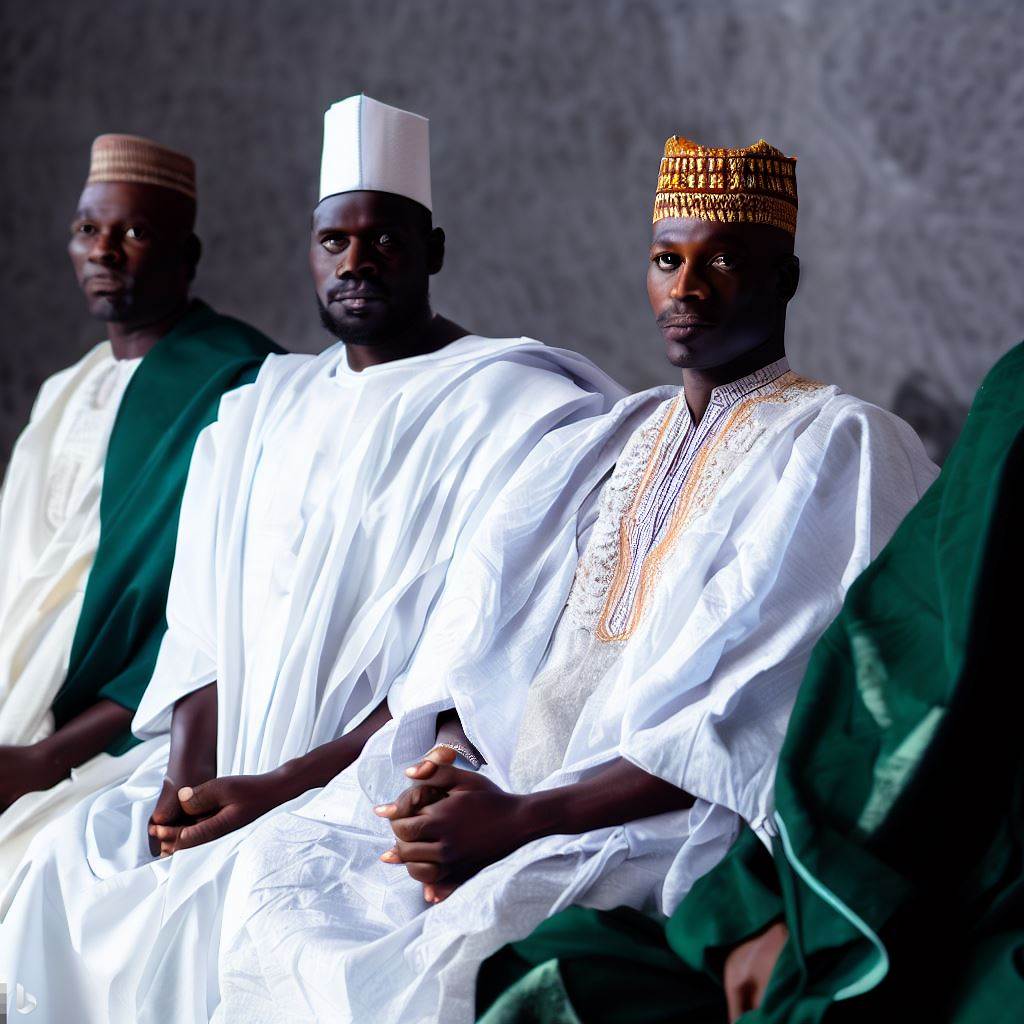Introduction
Nigeria is a federal republic with three branches of government – executive, legislative, and judiciary. The President, Vice President, and Cabinet make up the executive branch.
The legislative branch comprises the Senate and the House of Representatives, while the judiciary is headed by the Chief Justice of Nigeria.
The purpose of this blog post is to examine the organizational structure of the Nigerian government.
The Nigerian government has undergone significant changes since independence in 1960, with several reforms aimed at improving governance, transparency, and accountability.
This blog post will focus on the structure of the federal government, highlighting the roles and functions of the different arms of government, their relationship with one another, and their contributions to the overall development of Nigeria.
Read: Top 10 Highest Paying Professions in Nigeria: 2023 Edition
What is the Nigerian government system?
The Nigerian government system is a federal republic, operating under a presidential system.
- The executive branch is led by the president, serving two four-year terms through a popular vote.
- The legislative branch has the Senate and the House of Representatives, elected for four and two-year terms, respectively.
- The judiciary branch is headed by the Chief Justice, appointed by the president and approved by the Senate.
Corruption is a major issue, and the government has taken anti-corruption measures to combat it.
Nigeria’s government system is compared to the United States and the United Kingdom. It shares similarities but also notable differences, such as Nigeria’s federal system and the United Kingdom’s unitary state.
In essence, Nigeria’s government system is a federal republic, with three branches: executive, legislative, and judiciary.
The country faces the challenge of corruption but takes steps to address it. While similar to other systems, it also exhibits distinct features.
Read: Challenges and Triumphs: The Nigerian Military Story
The Executive Branch
The Executive Branch of the Nigerian Government is responsible for implementing and enforcing laws. It comprises the President, Vice President, and other key members and departments.
Description of the Executive Branch
- The Executive Branch is one of the three branches of the Nigerian Government.
- It is responsible for administering and implementing policies and laws.
- The branch consists of the President, Vice President, and other key members and departments.
Role and Responsibilities of the President and Vice President
- The President is the head of the Executive Branch and the Nigerian Government.
- He is responsible for ensuring the constitution is upheld, executing laws, and appointing key government officials.
- The Vice President supports the President and performs duties assigned by the President.
- The Vice President also serves as acting President when the President is absent or unable to perform his duties.
Other Key Members and Departments within the Executive Branch
- The Council of Ministers advises the President on policy and assists in the implementation of programs and projects.
- The Secretary to the Government of the Federation serves as the chief administrator of the federal government.
- The Attorney General of the Federation and Minister of Justice is responsible for legal affairs in the Executive Branch.
- The National Security Adviser advises the President on security issues and national defense.
- The Economic Advisers to the President provide advice on economic policies and planning.
- The National Planning Commission is responsible for developing and implementing economic plans and policies.
- The Independent National Electoral Commission is responsible for conducting elections in Nigeria.
The Executive Branch plays a crucial role in the governance of Nigeria. It is responsible for implementing policies and ensuring that laws are upheld in the country.
The President and Vice President, together with other key members and departments, work tirelessly to make sure that the country is moving in the right direction.
However, there is always room for improvement, and the Executive Branch must always strive to make Nigeria a better place for its citizens.
Read: Military Influence on Nigerian Politics: A Deep Dive
The Legislative Branch
- The Legislative Branch is one of the three branches of the Nigerian government.
- It is responsible for making laws and overseeing government activities.
- The Legislative Branch is made up of the National Assembly, which is a bicameral parliament.
- The National Assembly is composed of the Senate and the House of Representatives.
- The Senate has 109 members while the House of Representatives has 360 members.
- Members are elected for four-year terms.
- The role of the National Assembly is to represent the interests of the Nigerian people.
- It does this by making laws, approving the budget, and overseeing government activities.
- The National Assembly also has the power to impeach the president and other high-ranking officials.
- Other key members of the Legislative Branch include the Clerk of the National Assembly, who is responsible for the administration and management of the National Assembly.
- The Sergeant-at-Arms is responsible for maintaining order and security within the National Assembly.
- The National Assembly also has several committees, including the Committee on Appropriations, which is responsible for the country’s budget.
- Other key departments within the Legislative Branch include the National Assembly Service Commission, which is responsible for the welfare of National Assembly staff, and the Public Accounts Committee, which scrutinizes government expenditure.
The Legislative Branch plays a critical role in the Nigerian government.
It ensures that laws are made in the best interest of the Nigerian people and that government activities are carried out transparently and accountable.
The National Assembly and its various departments and committees work together to ensure that the country’s legislative process is efficient and effective.
By doing so, they help to create a strong and stable democracy that is responsive to the needs of its people.
Read: Career Opportunities in the Nigerian Military Profession
The Judiciary Branch
The Judiciary is an integral branch of the Nigerian government responsible for the dispensation of justice and the interpretation of laws.
Description of the Judiciary Branch
- The Judiciary Branch operates independently of both the Executive and Legislative branches.
- The head of the Judiciary is the Chief Justice of Nigeria who presides over the Supreme Court, the highest court in Nigeria.
- Other courts under the Judiciary include the Court of Appeal, the Federal High Court, the National Industrial Court, and the Sharia Court of Appeal.
Explanation of the Legal System in Nigeria
Nigeria operates a federal legal system that is a blend of the English common law, Islamic law, and customary law.
- The Constitution is the supreme law of Nigeria, and any law that is inconsistent with it is void to the extent of the inconsistency.
- The Nigerian legal system is based on the principle of the rule of law, which means that every person is subject to the law, and no one is above the law.
- The Nigerian legal system provides for the protection of fundamental human rights such as the right to life, liberty, and property.
Key Courts and Other Departments within the Judiciary Branch
- The Supreme Court is the highest court in Nigeria and has both appellate and original jurisdiction in certain cases.
- The Court of Appeal is the second-highest court in Nigeria and hears appeals from lower courts.
- The Federal High Court has jurisdiction over civil and criminal matters that involve federal laws and regulations.
- The National Industrial Court is a specialized court that has jurisdiction over labor-related matters.
- The Sharia Court of Appeal has jurisdiction over Islamic law in certain states that have adopted Sharia law.
- The Judicial Service Commission is responsible for the appointment, promotion, and discipline of all judicial officers in Nigeria.
- The National Judicial Council is responsible for the general administration of the courts and the appointment of judicial officers. It also investigates allegations of misconduct by judicial officers.
The Judiciary Branch is crucial to the governance of Nigeria as it ensures that justice is served and the rule of law is upheld.
However, like other branches of government, it faces challenges such as corruption, delays in the dispensation of justice, and inadequate funding.
These challenges undermine the effectiveness of the Judiciary and ultimately affect the rights of Nigerians.

State and Local Governments
In Nigeria, the government structure is divided into three tiers – federal, state, and local. This blog chapter will explore the organizational structure of the state and local governments in Nigeria.
Overview of state and local government structures in Nigeria
- The state government is responsible for the administration of the state, while the local government is responsible for the administration of the local areas.
- Each state is divided into local government areas, and there are 774 local government areas in Nigeria.
- The local government areas are further divided into wards, and there are over 10,000 wards in Nigeria.
- The state government consists of three branches – the executive, legislature, and judiciary.
- The local government council consists of the chairman, vice-chairman, councilors, and other officials.
Role and responsibilities of the state and local government
- The state government is responsible for the provision of infrastructure such as roads, hospitals, schools, and electricity.
- The state government is also responsible for the administration of justice and the welfare of its citizens.
- The local government is responsible for the provision of basic amenities such as water, sanitation, and primary education.
- The local government is also responsible for the collection of taxes and the maintenance of law and order in the local area.
- Both the state and local governments have the power to make laws for the good governance of their respective areas.
Comparison of state and local government structures in Nigeria with other countries
- In the United States, the state and local government structure is also divided into three tiers – federal, state, and local.
- The state governments in the US have more autonomy and power compared to the state governments in Nigeria.
- The local governments in the US also have more autonomy and are responsible for the provision of a wider range of services compared to local governments in Nigeria.
- In India, the government structure is divided into two tiers – the central government and the state government, and there are no local governments.
- The state governments in India have more autonomy and are responsible for the provision of a wider range of services compared to state governments in Nigeria.
Summarily, the state and local governments in Nigeria play a crucial role in the administration of the country.
They are responsible for providing basic amenities and infrastructure, maintaining law and order, and ensuring the welfare of the citizens.
Although the state and local governments in Nigeria have less autonomy and power compared to their counterparts in other countries, they are still essential for the proper functioning of the government structure in Nigeria.
Read: Nigerian Government and Military: A Comparative Study
You Might Also Like: Challenges and Triumphs: A Nigerian Politician’s Journey
Challenges and Reforms
Challenges to the Nigerian Government System
- Corruption and embezzlement of government funds
- Inefficiency and bureaucracy in government operations
- Ethnic and religious tensions leading to political instability
- Insufficient infrastructure and resources to meet the needs of the citizens
- Unemployment and poverty, particularly among the youth
- Insecurity and terrorism
- Lack of accountability and transparency in the government systems
These challenges have resulted in a lack of confidence in the government and a sense of disillusionment among the citizens.
The government has often failed to provide basic services and fulfill its duties, leading to a general feeling of discontent among the population.
Possible Reforms and Solutions to These Challenges
- Fighting corruption: The government must implement measures to curb corruption and embezzlement, including stronger anti-corruption laws and sanctions.
- Streamlining government operations: Streamline bureaucratic processes for faster and more effective service delivery to citizens.
- Promoting unity: Promote unity among different groups through policies promoting equality, social justice, and peaceful coexistence.
- Investing in infrastructure: Prioritize infrastructure development and basic services through increased funding and investment.
- Promoting job creation: Focus on job creation and entrepreneurship support with policies for business growth, credit access, and financing.
- Ensuring security: Address insecurity and terrorism through measures to combat terrorism and ensure citizen and business security.
- Instituting accountability measures: Ensure accountability and transparency with measures like public audits and access to government information.
Future Outlook for the Nigerian Government System
The Nigerian government has faced numerous challenges in its efforts to deliver services and meet the needs of the citizens.
However, there are emerging signs of progress in the implementation of reforms to address these challenges.
The government has shown a willingness to address corruption and promote accountability and transparency in its operations.
There has been an increase in investment in infrastructure development, job creation, and security measures to combat terrorism.
Looking ahead, the government needs to continue its efforts to address the challenges facing the country.
It must ensure that the reforms are implemented effectively and that citizens see tangible benefits from them.
There is a need to build on the progress made so far and strengthen the institutional capacity of the government to deliver services to the people.
The Nigerian government has the potential to transform the country and make it a more prosperous and secure nation for all its citizens.
Conclusion
The Nigerian government is structured in three tiers consisting of the federal, state, and local government. Each tier has its own responsibilities and functions.
The federal government is responsible for defense, foreign affairs, and national economic policies.
The state governments have responsibilities such as education, healthcare, and transportation, while the local governments are responsible for providing basic amenities.
It is important to understand the Nigerian government system for both citizens and investors. Citizens need to be aware of the different levels of government and the services they provide.
Investors need to be familiar with the government structure to navigate the business environment and comply with regulations.
Lastly, Nigeria’s government structure is complex and vast. Understanding its organizational structure helps citizens and investors navigate the system and identify their rights, responsibilities, and obligations.
The recommendation is for Nigeria to develop an efficient system, prioritizing accountability and transparency for driving growth and development.




